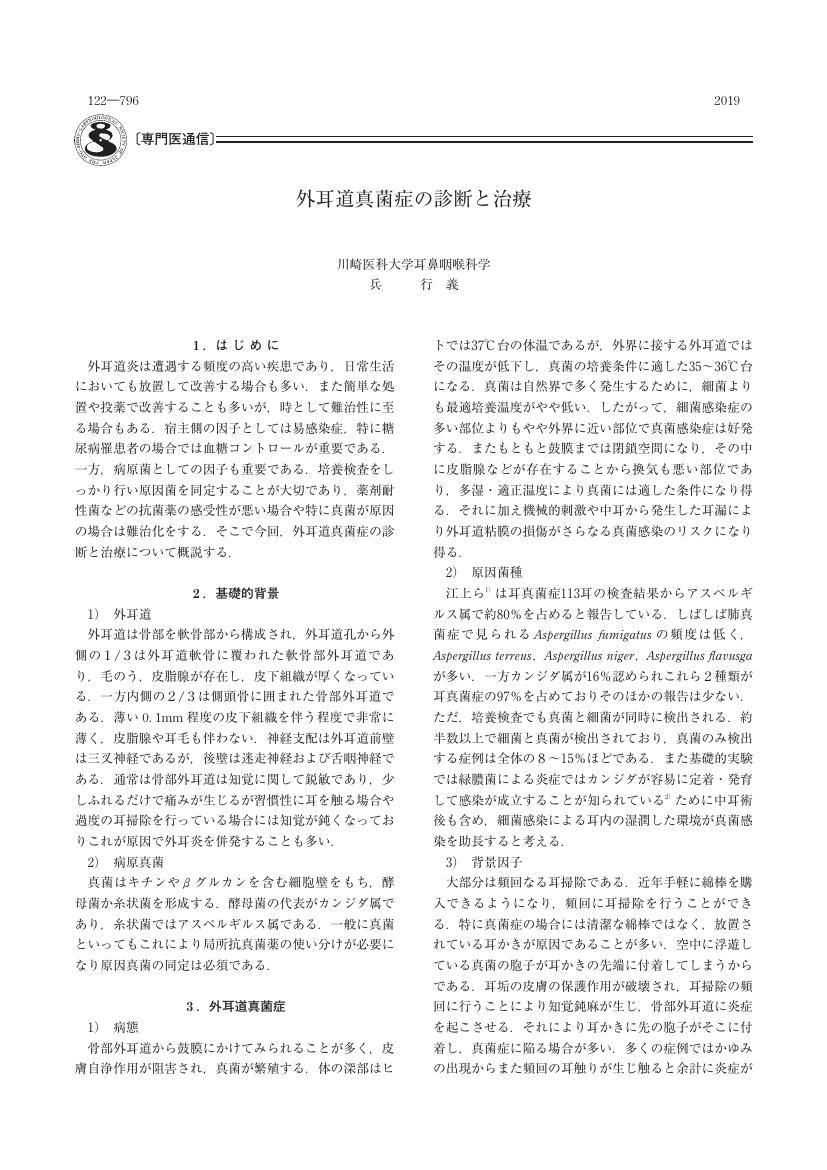4993 0 0 0 OA 外耳道真菌症の診断と治療
- 著者
- 兵 行義
- 出版者
- 一般社団法人 日本耳鼻咽喉科頭頸部外科学会
- 雑誌
- 日本耳鼻咽喉科学会会報 (ISSN:00306622)
- 巻号頁・発行日
- vol.122, no.5, pp.796-798, 2019-05-20 (Released:2019-06-12)
- 参考文献数
- 4
14 0 0 0 両側高度感音難聴を合併した川崎病例
- 著者
- 濵本 真一 兵 行義 田中 浩喜 舘 俊廣 森田 倫正 福島 久毅 原田 保
- 出版者
- The Society of Practical Otolaryngology
- 雑誌
- 耳鼻咽喉科臨床 (ISSN:00326313)
- 巻号頁・発行日
- vol.106, no.8, pp.693-697, 2013 (Released:2013-08-01)
- 参考文献数
- 29
- 被引用文献数
- 1
Kawasaki disease (KD) is an idiopathic systemic vasculitis common in infants and children that affects predominantly small and medium-sized extraparenchymal muscular arteries. KD manifests various clinical symptoms, of which coronary aneurysms are the most important complication. However, the association of sensorineural hearing loss with KD is rare. A 7-year-old girl with KD was referred to our department with a chief complaint of hearing loss. In her hearing test, she showed a high degree of bilateral sensorineural hearing loss. Although the patient was treated with steroid pulse therapy (methylprednisolone), her hearing level deteriorated. Two weeks after steroid therapy, a slight improvement was seen. Thereafter, the patient started to use hearing aids. About one year has elapsed since the onset of hearing loss, but her hearing level has not improved.
1 0 0 0 スギ・ヒノキ花粉症におけるスギ皮下免疫療法の臨床的・血清学的効果
- 著者
- 兵 行義 雑賀 太郎 濵本 真一 原田 保 原 浩貴
- 出版者
- 耳鼻咽喉科臨床学会
- 雑誌
- 耳鼻咽喉科臨床 (ISSN:00326313)
- 巻号頁・発行日
- vol.111, no.4, pp.227-234, 2018 (Released:2018-04-01)
- 参考文献数
- 16
- 被引用文献数
- 1
The number of patients suffering from cedar pollinosis is increasing. It would be no exaggeration to say that it is the unique cause of allergic rhinitis in Japan. Allergen immunotherapy has recently attracted attention as a radical treatment for cedar pollinosis, just as for allergic rhinitis. We examined cedar pollinosis was more marked in the cypress season than in the cedar season. The present study included 27 patients who had received allergen immunotherapy for cedar pollinosis for more than a year. A questionnaire survey was also conducted on drug usage according to the Japanese Allergic Conjunctival Disease QOL Questionnaire (JACQLQ), a modified version of the Japanese Allergic Rhinitis Standard QOL Questionnaire.In 2015, the amount of scattered pollen was 1660.7/cm2, being lower than the average of the past 20 years. In patients who had received immunotherapy against cedar pollinosis regardless of the duration of the therapy, the nasal and eye symptoms, medication score, and face scale were worse in the cypress season. In addition, tests for allergn-specific IgE antibodies before and after the cedar/cypress seasons demonstrated that while the cedar-specific IgE levels did not increase, the cypress-specific IgE levels significantly increased in subjects who had received immunotherapy for shorter periods. Cypress-specific IgG4 levels tended to increase in patients who had received cedar-pollen immunotherpy for longer periods, however, to a lesser degree than the cedar-specific IgG4 levels.Thus, the allergen-speccific antibody titers demonstrated the ineffectiveness of cedar allergen immunotherapy against cypress pollen allergy in 2015, in which year, the average amounts of airborne pollen was lower than the average in the last 20 years, suggesting that cypress extracts should also be developed to treat cypress pollen allergy.
